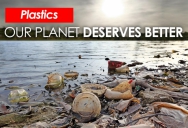
S&Ds back EU strategy to end plastic litter by 2030
Date
Wed, 09/12/2018
Sections
Climate & Environment
Socialists and Democrats in the European Parliament are leading the transition to a circular economy, where all products are designed to be either recycled, re-used or remanufactured. S&D MEP Simona Bonafè was the author of four parliamentary reports for a circular economy, and she called on the Commission to present a specific strategy to phase out plastic waste. Tomorrow, the plenary of the European Parliament will vote on this new strategy.
S&D MEP Simona Bonafè said:
“We fully endorse the Commission’s objective to make all plastic material reusable and recyclable by 2030. This is in line with the outcome of the agreement on the Waste Package, and also with the transition to a circular economy.
“We must change the way plastics and plastic products are designed, produced, used and recycled. We hope the Commission fully respects the commitments endorsed by the strategy throughout all of its policy. We also hope for a quick implementation of measures to reduce the impact of single-use plastics. This is especially urgent in our seas and oceans, where 100,000 tonnes of micro-plastics are floating and putting animal and human health at risk.”
Kathleen Van Brempt, S&D vice-president for sustainability, said:
“The EU is the world pioneer in adopting a strategy to put an end to plastic litter, both on land and at sea. We, Socialists and Democrats, will not lift the pressure on the Commission and Council to strike a deal on the Single-Use Plastic Directive before the end of this term.
“We also need new polices and measures to stimulate the demand for secondary plastics in order to ensure that recyclable plastics are actually recycled. Therefore, we need to introduce minimal recycled content standards for recycled plastics in new products coming onto the European market.”
S&D spokesperson for health and the environment, Miriam Dalli, said:
“Despite new technologies and fast innovation in the chemical industry, we are still failing to reduce our dependency on plastics. This dependency means that more than 300 million tonnes of plastics are produced worldwide, with millions of tonnes of waste ending up in the environment, and critically in our oceans.
“Not all plastic is bad, but we need to change our approach towards consumption and how to discard it. This strategy should stimulate new, smart and circular business, production and consumption models covering the entire value chain. Preventing the production of such huge quantities of waste in the first place is possible by decreasing their use, increasing recycling and producing reusable material, whilst ensuring they are disposed of responsibly.”

